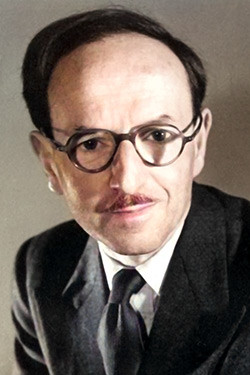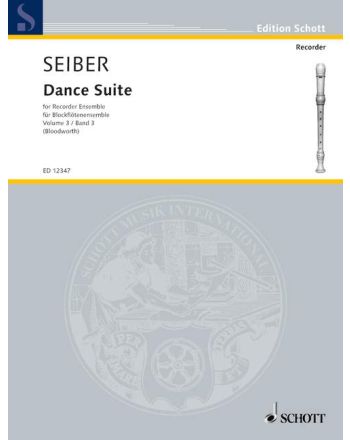
Mátyás Seiber
About Mátyás Seiber
Mátyás Seiber grew up in Budapest. After attending the grammar school, where he was regarded as 'outstanding' in Mathematics and Latin, he progressed to the Franz Liszt Academy of Music to study with Kodály. He developed an interest in medieval plainchant, and built on the research of Kodály and Bartók, providing vocal setting of many nations’ folksongs. He had a gift for languages. Many choirs benefited over the years from these lifelong interests.
While still in Hungary, he entered his Wind Sextet (1925) in a composition competition – with Kodály and Bartók on the jury. The opponents to the “progressive” music he personified did not allow him to win; furious, Bartók resigned from the jury. In 1927 he left Hungary, and started lecturing in Frankfurt, with a reference from Kodály. There he inaugurated the first academic study of Jazz. In the early 1930’s, the Nazi disapproval of Jazz and Jews (however secular) entailed emigration. After a period travelling as part of a ship’s string quartet, playing his first instrument, the cello, he settled in London in the mid-thirties. He taught musical appreciation at Morley College, at the invitation of Michael Tippett. Later, but while still at Morley College, he trained his own choir, The Dorian Singers, who disbanded only on his death. He also became renowned for his teaching of composition, from home in Caterham, where he moved after marriage in 1947 to Lilla Bauer, another Hungarian émigré, a Ballet Jooss dancer. She trained with Laban, then lectured at Goldsmith’s College.
Seiber’s reputation as a teacher-composer attracted pupils including Hugh Wood, Tony Gilbert, Peter Racine Fricker, (who regarded him as the foremost teacher of the century), Ingvar Lidholm, Hinner Bauch, and from Australia, Don Banks. Seiber’s works were performed at Cheltenham, at Venice, and other national and international Music Festivals. He was a founder member of the Society for Promotion of New Music, actively pursuing this throughout his life. He did much to bring Bartók’s work to public notice in Britain. His life and work linked and developed many diverse musical influences, from the Hungarian tradition of Bartók and Kodály, to Schoenberg and Serial Music, to jazz, folksong, film and lighter music, (rewarded by an Ivor Novello Prize for ‘By The Fountains of Rome’). A late collaboration with John Dankworth produced the Improvisations for Jazz Band and Orchestra (1959). His friendships and work associations embraced many soloists including Tibor Varga, Norbert Brainin, guitarists Julian Bream and John Williams, percussionist Jimmy Blades, folksinger Bert Lloyd, and Peter Pears. He also composed film music for his friends, the progressive animation couple Halas & Batchelor, the best known being ‘Animal Farm’. Other film scores included ‘A Town like Alice’. Some of his lighter music, especially dance accompaniments and for the accordion was published under the George S. Mathis pseudonym.
He was tragically killed in a car accident in South Africa while on a lecture tour in 1960. His former teacher Kodály and György Ligeti both composed pieces in memoriam.
Worklist
Gallery


Chronology
Born in Budapest
Studied in Budapest with Kodaly and discovered a striking similarity between Macedonian folk music and Plato's 5th-century musical descriptions
Lived in Germany as a musician, journalist, cellist, and conductor
Head of the first European jazz class at the Hochschen Konservatorium in Frankfurt
Emigrates to England
Founder of the 'Dorian Singers' in London and wrote the soundtrack for the film adaptation of 'Animal Farm'
Died in a car accident near Johannesburg, South Africa
Kodaly and Ligeti write works in Seiber's memory
Products
-
Composer: Mátyás SeiberSeries: Edition Schott
Instrumentation: percussionProduct number: BSS 32379Product TypeIn stockAs low as €9.99Incl. Tax -
(Ungarn)Composer: Mátyás SeiberArranger: Hilger SchallehnEdition: Choral scoreSeries: Schott Choral Music
Instrumentation: men's choir (TTBB)Product number: C 46029Product TypeIn stockAs low as €1.99Incl. Tax -
(Ungarn)Composer: Mátyás SeiberArranger: Hilger SchallehnEdition: Choral scoreSeries: Schott Choral Music
Instrumentation: female choir (SSAA)Product number: C 46028Product TypeIn stockAs low as €1.99Incl. Tax -
Composer: Mátyás SeiberSeries: Edition Schott
Instrumentation: clarinet and pianoProduct number: ED 10527Product TypeIn stockAs low as €4.99Incl. Tax -
for string orchestraComposer: Mátyás SeiberMedia Type: Hire/performance materialEdition: Performance materialInstrumentation: string orchestra
-
Composer: Mátyás SeiberArranger: Rainer MohrsMedia Type: E-score PDFInstrumentation: cello and pianoProduct number: ED 23042 Q54802In stock€2.99Incl. Tax
-
BluesComposer: Mátyás SeiberArranger: Rainer ButzMedia Type: E-score PDFInstrumentation: 3 soprano recordersProduct number: ED 20789 Q13574In stock€1.99Incl. Tax
-
The Four SeasonsComposer: Mátyás SeiberEdition: Piano reductionSeries: Edition Schott
Cantata Secularis
Instrumentation: mixed choir and orchestraProduct number: ED 10714Product TypeIn stockAs low as €33.99Incl. Tax -
The Four SeasonsComposer: Mátyás SeiberMedia Type: Hire/performance materialEdition: Performance materialInstrumentation: mixed choir and orchestraLanguage: Latin
-
Composer: Mátyás SeiberSeries: Edition Schott
Instrumentation: violin and pianoProduct number: ED 10429Product TypeIn stockAs low as €10.99Incl. Tax -
arranged for clarinet in B flat and pianoComposer: Mátyás SeiberEdition: Piano reduction with solo partSeries: Concertino
Instrumentation: clarinet and pianoProduct number: ED 10341Product TypeIn stockAs low as €11.99Incl. Tax -
for clarinet in B flat and string orchestraComposer: Mátyás SeiberMedia Type: Hire/performance materialEdition: Performance materialInstrumentation: clarinet and string orchestra
-
7 Modern DancesComposer: Mátyás SeiberArranger: Wolfgang LichterEdition: ScoreSeries: Concertino
Edition Schott
Instrumentation: orchestraProduct number: CON 257Product TypeIn stockAs low as €17.99Incl. Tax -
from "Easy Dances"Composer: Mátyás SeiberArranger: Stefan de HaanInstrumentation: flute and pianoProduct number: ED 12426Product TypeIn stockAs low as €7.99Incl. Tax
-
from "Easy Dances"Composer: Mátyás SeiberArranger: Stefan de HaanInstrumentation: alto saxophone and pianoProduct number: ED 12424Product TypeIn stockAs low as €5.99Incl. Tax
-
from "Easy Dances"Composer: Mátyás SeiberArranger: Stefan de HaanInstrumentation: clarinet and pianoProduct number: ED 12423Product TypeIn stockAs low as €7.99Incl. Tax
-
Composer: Mátyás SeiberArranger: Denis BloodworthEdition: Score and partsSeries: Edition Schott
Dance Suite, Vol. 3
Instrumentation: 4 recorders (SATB)Product number: ED 12347Product TypeIn stockAs low as €9.99Incl. Tax -
Composer: Mátyás SeiberArranger: Denis BloodworthEdition: Score and partsSeries: Edition Schott
Dance Suite, Vol. 2
Instrumentation: 4 recorders (SATB)Product number: ED 12252Product TypeIn stockAs low as €10.99Incl. Tax -
Composer: Mátyás SeiberArranger: Denis BloodworthEdition: Score and partsSeries: Edition Schott
Dance Suite, Vol. 1
Instrumentation: 4 recorders (SATB)Product number: ED 12251Product TypeIn stockAs low as €8.99Incl. Tax -
7 Modern DancesComposer: Mátyás SeiberArranger: Wolfgang LichterMedia Type: Sheet musicEdition: Set of parts, each 1 flute I, flute II, Clarinet, oboe, saxophon, trumpet, basson, 4 violin I, 4 violin II, 3 viola, 3 cello, 2 double bassSeries: Concertino
Edition Schott
Instrumentation: orchestraProduct number: CON 257-50In stock€84.00Incl. Tax, Excl. Shipping -
Selected Pieces from "Leichte fur Piano"Composer: Mátyás SeiberMedia Type: Sheet musicEdition: Set of partsInstrumentation: flute, oboe, clarinet and bassoon (alto saxophone)Product number: ED 12429In stock€15.50Incl. Tax, Excl. Shipping
-
from "Light Dance for Piano"Composer: Mátyás SeiberArranger: Stefan de HaanMedia Type: Sheet musicInstrumentation: trumpet and pianoProduct number: ED 12425In stock€10.00Incl. Tax, Excl. Shipping
-
for clarinet and string quartetComposer: Mátyás SeiberEdition: Score and partsSeries: Edition Schott
Instrumentation: clarinet in Bb and string quartetProduct number: ED 13718Product TypeIn stockAs low as €25.99Incl. Tax -
from "Four Greek Folk Songs"Composer: Mátyás SeiberMedia Type: E-score PDFInstrumentation: solo voice and pianoProduct number: bh65 Q38607In stock€2.99Incl. Tax
-
A Collection of new Dance-rhythmsProduct TypeIn stockAs low as €9.99Incl. Tax
-
Ein Querschnitt durch die neuen Tanzrhythmen für instruktive ZweckeProduct TypeIn stockAs low as €10.99Incl. Tax
-
Composer: Mátyás SeiberSeries: Edition Schott
Instrumentation: 1 or 2 violins and piano or 2 violins aloneProduct number: ED 2287Product TypeIn stockAs low as €10.99Incl. Tax -
Composer: Mátyás SeiberSeries: Edition Schott
Instrumentation: 1 or 2 violins and piano or 2 violins aloneProduct number: ED 2286Product TypeIn stockAs low as €10.99Incl. Tax -
Vol. 1 | An introduction to new dance rhythmsProduct TypeIn stockAs low as €9.99Incl. Tax
-
Composer: Mátyás SeiberEdition: Piano reduction with solo partSeries: Edition Schott
Elegy
Instrumentation: viola and small orchestraProduct number: ED 10422Product TypeIn stockAs low as €7.99Incl. Tax -
for viola and small orchestraComposer: Mátyás SeiberMedia Type: Hire/performance materialEdition: Performance materialInstrumentation: viola and small orchestra
-
for violin and string orchestraComposer: Mátyás SeiberMedia Type: Hire/performance materialEdition: Performance materialInstrumentation: violin and string orchestra
-
Composer: Mátyás SeiberMedia Type: Sheet musicEdition: Study scoreSeries: Fantasia concertante
Instrumentation: Violin and String OrchestraProduct number: AVV 64In stock€18.00Incl. Tax, Excl. Shipping -
Composer: Mátyás SeiberMedia Type: Sheet musicEdition: Piano reduction with solo partSeries: Fantasia concertante
Instrumentation: violin and string orchestraProduct number: AVV 2In stock€16.50Incl. Tax, Excl. Shipping -
Suite corale per narratore, coro e orchestra su testo di Johann Wolfgang von Goethe (testo tedesco e inglese nella traduzione di Louis Mc Neice)
-
Composer: Mátyás SeiberSeries: Edition Schott
Instrumentation: high voice and guitarProduct number: ED 10637Product TypeIn stockAs low as €5.99Incl. Tax -
Composer: Mátyás SeiberMedia Type: Sheet musicEdition: Piano reductionInstrumentation: high voice and string orchestra or string quartetLanguage: EnglishProduct number: BH 2366In stock€22.50Incl. Tax, Excl. Shipping
-
per voce, viola d’amore (o viola), viola da gamba (o violoncello) e chitarra
-
Composer: Mátyás SeiberArranger: Rainer MohrsMedia Type: E-score PDFInstrumentation: cello and pianoProduct number: ED 23042 Q54806In stock€2.99Incl. Tax
-
Composer: Mátyás SeiberArranger: Rainer MohrsMedia Type: E-score PDFInstrumentation: cello and pianoProduct number: ED 23042 Q54804In stock€2.99Incl. Tax
-
from "Four Greek Folk Songs"Composer: Mátyás SeiberMedia Type: E-score PDFInstrumentation: solo voice and pianoProduct number: bh66 Q38608In stock€2.99Incl. Tax
-
Composer: Mátyás SeiberSeries: Edition Schott
Instrumentation: oboe and pianoProduct number: ED 10648Product TypeIn stockAs low as €5.99Incl. Tax -
for jazzband and orchestraComposer: John Dankworth | Mátyás SeiberMedia Type: Hire/performance materialEdition: Performance materialInstrumentation: Jazzband and orchestra
-
Composer: John Dankworth | Mátyás SeiberMedia Type: Sheet musicEdition: Study scoreSeries: Improvisations
Instrumentation: Jazzband and symphonic orchestraProduct number: ED 10728In stock€21.00Incl. Tax, Excl. Shipping -
for clarinet, cello and pianoComposer: Mátyás SeiberEdition: Score and partsSeries: Edition Schott
Instrumentation: clarinet, cello and pianoProduct number: ED 14107Product TypeIn stockAs low as €7.99Incl. Tax -
Product TypeIn stockAs low as €9.99Incl. Tax
-
Composer: Mátyás SeiberMedia Type: Sheet musicEdition: Set of partsInstrumentation: accordion orchestraProduct number: MH 21207-10Out of stock€60.50Incl. Tax, Excl. Shipping
-
Composer: Mátyás SeiberArranger: Rudolf WuerthnerMedia Type: Sheet musicEdition: ScoreInstrumentation: accordion orchestraProduct number: MH 21207Out of stock€18.45Incl. Tax, Excl. Shipping
-
Composer: Mátyás SeiberEdition: Piano reduction with solo partSeries: Edition Schott
Notturno
Instrumentation: horn and string orchestraProduct number: ED 10336Product TypeIn stockAs low as €7.99Incl. Tax -
Composer: Mátyás SeiberEdition: Study scoreSeries: Edition Schott
Notturno
Instrumentation: horn and string orchestraProduct number: ED 10204Product TypeIn stockAs low as €14.99Incl. Tax





































